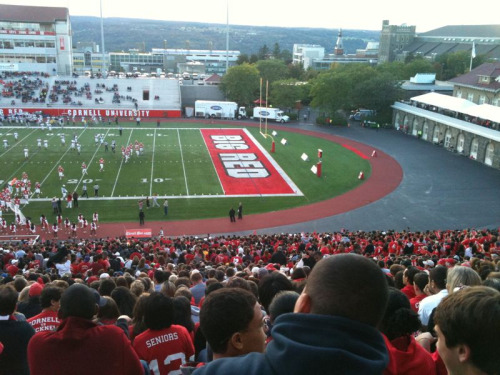 | ||
Archives
|
September 2011
Of Median Grades and Economics Minors
Life has been busy lately, and as such I've been negligent in commenting on some pretty weighty subjects like the proposed New York City tech campus and Skorton's call to end pledging in the Greek system (hint: I'm still not a supporter of the Greek system), but I did want to quickly comment on two recent issues that have percolated up in The Sun. The first is whether or not median grades should be published on student transcript. Writes the Sun: Yet, here again, the policy falls short. Posting raw median grades alone on transcripts poses more potential confusion for would-be employers and graduate schools than potential good. Students who consistently challenge themselves with more difficult courses, but underperform the median should not be classified as below average academically based solely on a raw median grade. The Sun's editorial is correct in asserting that posting median grades won't ease all of the pitfalls of assessing student performance by a transcript, and some sort of GPA that normalizes for the difficulty of classes should certainly be calculated. But median graduates on transcripts certainly won't hurt. Both employers and graduate schools will have more information when comparing Cornell student performance to students at other schools with more grade inflation. And students will have more incentive to work and study hard to actually learn the material, which will help them down the road in their job interviews and graduate study. Some students will surely argue that posting median grades on transcripts will only make Cornell more competitive, but that's a red herring: what makes Cornell 'competitive' are the students, not the professors or grading, and if every student did well on their academics professors wouldn't think twice about giving everybody good grades. Curves really only help students. I'll always remember one of my rigorous econometric courses from senior year where the median grade had traditionally been a B, but the class did so well that semester that the median grade ended up being an A-minus. So it's really just another case of students doth protesting too much. Speaking of econometrics, there's more news coming out about the new integrated economics department, which I previously wrote about in July. Writes the Sun: As the year continues, many of the changes may become more noticeable, Easley said. One of the first changes is that courses will no longer be crosslisted, but will now be listed primarily under economics. For example, labor economics, listed as an ILR class, will be listed as an economics class. One goal for the new economics department should be the creation of an economics concentration/minor that would be open to students from any of the seven undergraduate colleges. I'm thinking of a five or six course requirement comprised of intermediate mico and macro, econometrics, and two to three upper-level courses including one that incorporates empirical research/data analysis into the curriculum. This will not only help to integrate economic-thinking across the disciplines in all of the colleges, and encourage the cross-pollination of ideas, but also boost Cornell's visibility when it comes to recruiting students. Employers can often be confused by the differences between the undergraduate colleges, but an economics minor would allow for a level basis upon which Cornell students could present themselves. When I was in the ILR School I was able to complete a formal economics concentration, but I believe they eliminated that option soon after I graduated. Late Update: I'm now told that the ILR school still offers a formal concentration in economics, but neither the ILR or Economics departments websites mention this opportunity. Matthew Nagowski | September 24, 2011 (#) Homecoming Recap East Hill was in fine fashion for Homecoming yesterday afternoon. Kudos to Athletics and Alumni Affairs for pushing back the start time to the football game until 6PM: not only did alumni and students have more time to revel the afternoon away, but as the clouds didn't break until 2PM, it took a while for the air to warm up, and by 4 PM we were all tailgating in fine fashion. So dare I suggest that Cornell might actually be able to reach its goal of rekindling its Homecoming Tradition into a genuine event within a couple more years, and selling out the Crescent in time for the sesquicentennial? By my measure the Crescent was probably 60-70% full yesterday:  Various observations: * The University ordered 10,000 class t-shirts to pass out to undergraduates. The Class of 2014 t-shirt is pretty sporty with a v-neck and some striping on the sleeves. And special thanks goes out to the undergraduate volunteer who thought that I could still potentially pass as a sophomore to procure aforementioned t-shirt. * With a football game at 6PM, a Glee Club concert at 8PM, and a Cornell Concert Commission concert at 9PM, perhaps more thought should be put into the timing of Homecoming events. * The much lauded parade from last year was visibly absent this year. And missed. * To all of the underage undergraduates on Ho Plaza who refused my offering of free beer: Bravo. You made Ezra, and David Skorton, proud. * One of the reasons why I love returning to Cornell so much is the ease with which you can strike-up friendships with Cornellians, both rekindling old ones and forging new ones. * Cornell really needs a homecoming bonfire. But as Cornell's Risk Management office would never allow such a fiasco, perhaps the engineers could project some sort of digital video of a bonfire onto Duffield Hall's facade, or something. * Also, Milstein Hall is neat, but totally not worth the $50MM the University spent to add 50,000 square feet to its physical plant. But more about that later. Matthew Nagowski | September 18, 2011 (#) My Cornell Bookshelf Seeing as how I just posted this on my personal blog, I might as well cross-post it here as well. I've just re-arranged and categorized my collection of Cornelliana books and decided to snap a picture. See if you can't name them all!  Matthew Nagowski | September 14, 2011 (#) The Sun's Opinion Section Has Suddenly Gotten Good With some rare exceptions, like Andrew Daines and Rob Fishman he Sun's opinion section has been mired in mediocrity for the last half decade or so, with tepid over-characterizations of campus life and embarrassing sex columnists, but look now, because Tom Moore has a dandy in today's Sun -- a rather insightful critique on his generation's political apathy: Don't take this as a rant against hipsters, because this is much bigger than whatever caricature you have stored away of those vinyl-loving bohemians. The obsession with irony and satire is pandemic to our generation, and however clever a joke is, at the end of the day it does nothing more than trivialize dire world events and sedate the very people who could be doing something about them. Activism died not the coughing, spluttering death of a passionate crowd submerged in tear gas, but rather the uncomfortable, throat-clearing death of the wrong joke at the wrong cocktail party. And this comes on the heels of last week's thoroughly enjoyable post-modern analysis of Facebook's meanings by Nathan Tailleur. Whatever they've put in the water down on West State Street, please keep up the good work! Matthew Nagowski | September 13, 2011 (#) Remembering the 11th As a first semester freshman in the fall of 2001, I enrolled in a writing seminar in the Anthropology Department entitled "Freedom and Socio-Cultural Control". Taught by a graduate student, the course explored the meaning of freedom through the lens of various cultures, with students encouraged to look for the way that culture spawns hegemonic thinking, tacitly controlling one's life perspectives, including our own. The class met on Tuesdays and Thursdays from 8:40 to 10:10 in the morning, and I did not have any other morning classes on those days. Despite the writing seminar label, the reading load was heavy, with 100+ pages of Michel Foucault, Isiah Berlin, or Naomi Klein assigned on a weekly basis. As a wet-behind the ears Cornellian whose high school curriculum didn't include dense philosophical treatises, the reading was a challenge, and I would venture off to Uris Library after every class to find a secluded spot and dig into the class's reading on our distorted American view of 'freedom' for an hour or two. So it wasn't until around lunchtime that I heard about the attack on New York City. Matthew Nagowski | September 11, 2011 (#) |
-- WSJ: Cornell Wins NYC Tech Campus Bid (EBilmes) -- Barrier Update: City Approves Nets (DJost) -- Big Red Cymbal Guy (Nagowski) -- New York Times Survey on Campus Recruiting is Flawed (KScott) -- Barrier Update: Legal precedent suggests City of Ithaca will not be held liable for gorge suicide (DJost) -- Despite MSG Loss, Big Potential for Big Red Hockey (EBilmes) -- City Council Will Vote on Suicide Nets (DJost) -- An Encounter on the Upper East Side (Nagowski) -- Showing Off Your School Spirit (Nagowski) -- Chipotle Ithaca? (KScott) -- Cornell at the ING NYC Marathon (KScott) -- Crossing Over a Fine Line: Commercial Activity on Campus (KScott) -- Milstein's Downfall (Nagowski) -- Can any Cornell-associated organization really be independent of the University? (Nagowski) -- Slope Media Revisited (EBilmes) -- Slope Media Group Approved for Byline Funding (KScott) -- Occupy AEM? (KScott) -- New campus pub to be good for both Greeks and non-Greeks (Nagowski) -- Gagging the Election (Nagowski) -- The Changing Structure of Rush Week (Nagowski) -- Ivy League Humility in the Midwest (EBilmes) -- Of Median Grades and Economics Minors (Nagowski) -- Homecoming Recap (Nagowski) -- My Cornell Bookshelf (Nagowski) -- The Sun's Opinion Section Has Suddenly Gotten Good (Nagowski) -- Remembering the 11th (Nagowski) -- Cornellian Tapped as Top Economic Advisor (Nagowski) -- Cutting Pledging, and the Good Which Comes With It (EBilmes) -- Why Cornell Should Not Close Fall Creek Gorge (Nagowski) -- Welcome to the Class of 2015 (Nagowski)  |